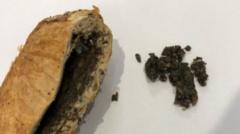Erin Patterson, 50, has been convicted of murdering three family members and attempting to kill a fourth by serving a beef Wellington laced with toxic mushrooms.
Erin Patterson Found Guilty of Murder in Toxic Mushroom Case

Erin Patterson Found Guilty of Murder in Toxic Mushroom Case
A Victorian woman is convicted of murdering relatives with deadly mushrooms in a meal.
In a high-profile trial that captivated Australia, Erin Patterson, a resident of Morwell, Victoria, was found guilty of murdering three relatives using a deadly beef Wellington meal infused with death cap mushrooms. The jury also determined she attempted to murder a fourth person, who survived the toxic meal served on July 29, 2023. The court revealed chilling evidence indicating that Patterson sourced these lethal mushrooms and attempted to cover her tracks after the tragedy.
The deceased included Patterson's former in-laws, Don and Gail Patterson, both 70, and Gail's sister, Heather Wilkinson, 66. Local pastor Ian Wilkinson, Heather's husband, survived a harrowing recovery in the hospital. Notably, Patterson's estranged husband, Simon, avoided the gathering at the last moment, citing discomfort due to marital tensions.
Following the verdict, the Supreme Court of Victoria released over 100 images presented as evidence during the trial. Some infamous photos depicted the beef Wellington leftovers obtained from Patterson's residence, preserved in specimen bags to ensure no contamination. These remnants were subsequently analyzed for traces of the toxic death cap mushrooms, which are recognized as the most fatal fungi due to their potent toxins.
Patterson claimed she purchased the mushrooms dried from a Melbourne Asian grocery, yet she could not specify the location or retrieve any receipts, alleging she paid cash for the undistinguished product. This raised suspicions, especially since local sightings of death cap mushrooms were documented in nearby towns before the incident. Posts sourcing on the app iNaturalist corroborated these findings along with Patterson’s own search history on the same application.
Further incriminating evidence came in the form of mobile phone location data indicating Patterson's travels to areas known for death cap mushrooms and purchases of a food dehydrator. Forensic analysis even revealed images on her phone consistent with death cap mushrooms, along with traces of these toxic fungi found in the food dehydrator which Patterson disposed of the day after the meal, despite her claims of never owning one.
CCTV footage from the local dump captured Patterson discarding the dehydrator, while she initially resisted medical advice to treat her and her children for suspected mushroom poisoning. Only she exhibited symptoms of illness after consuming the meal. The plot thickened as forensic tests revealed traces of death cap mushrooms on the appliance. Overall, the evidence strongly indicated deliberate malice in this tragic case, shaking the local community and the nation alike.
The deceased included Patterson's former in-laws, Don and Gail Patterson, both 70, and Gail's sister, Heather Wilkinson, 66. Local pastor Ian Wilkinson, Heather's husband, survived a harrowing recovery in the hospital. Notably, Patterson's estranged husband, Simon, avoided the gathering at the last moment, citing discomfort due to marital tensions.
Following the verdict, the Supreme Court of Victoria released over 100 images presented as evidence during the trial. Some infamous photos depicted the beef Wellington leftovers obtained from Patterson's residence, preserved in specimen bags to ensure no contamination. These remnants were subsequently analyzed for traces of the toxic death cap mushrooms, which are recognized as the most fatal fungi due to their potent toxins.
Patterson claimed she purchased the mushrooms dried from a Melbourne Asian grocery, yet she could not specify the location or retrieve any receipts, alleging she paid cash for the undistinguished product. This raised suspicions, especially since local sightings of death cap mushrooms were documented in nearby towns before the incident. Posts sourcing on the app iNaturalist corroborated these findings along with Patterson’s own search history on the same application.
Further incriminating evidence came in the form of mobile phone location data indicating Patterson's travels to areas known for death cap mushrooms and purchases of a food dehydrator. Forensic analysis even revealed images on her phone consistent with death cap mushrooms, along with traces of these toxic fungi found in the food dehydrator which Patterson disposed of the day after the meal, despite her claims of never owning one.
CCTV footage from the local dump captured Patterson discarding the dehydrator, while she initially resisted medical advice to treat her and her children for suspected mushroom poisoning. Only she exhibited symptoms of illness after consuming the meal. The plot thickened as forensic tests revealed traces of death cap mushrooms on the appliance. Overall, the evidence strongly indicated deliberate malice in this tragic case, shaking the local community and the nation alike.


















